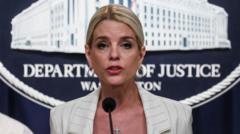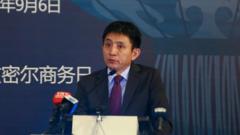South Korea is navigating a complex economic situation following President Trump's significant tariffs on its automotive sector. As trade negotiators head to Washington, the government announces measures to bolster its carmakers while emphasizing the need for ongoing collaboration with the United States.
South Korea Struggles with Tariff Impact, Seeks U.S. Negotiations

South Korea Struggles with Tariff Impact, Seeks U.S. Negotiations
As South Korea grapples with the fallout from Trump’s tariffs, its leaders look for a strategic way to engage with the U.S.
As the South Korean government searches for solutions to mitigate adverse effects from President Trump’s tariffs, officials are keen on maintaining a favorable trade relationship with the United States. The response to the tariffs centered on bolstering the automotive industry, a crucial element of South Korea's economy.
On April 9, 2025, as trade discussions ramp up in the U.S. capital, South Korea’s Prime Minister Han Duck-soo highlighted the delicate nature of the trade relations between the two nations. The current situation follows a concerning announcement by Trump, where hefty tariffs of up to 25% were imposed on South Korean vehicles, putting pressure on an industry that is pivotal to the country’s export-driven economy.
In a recent statement, Trump expressed optimism about the negotiations with South Korea, which promotes a proactive stance on trade. However, in response to these tariffs, Prime Minister Han indicated South Korea would not align with China against the U.S., opting instead for diplomatic engagement. He emphasized the importance of negotiations to improve the situation rather than retaliatory measures that could exacerbate trade tensions.
The South Korean government unveiled plans to increase financial support for its automotive sector to approximately $10 billion, raising it from the previously allocated $11 billion. This funding aims to mitigate the impact on carmakers, with additional incentives like reduced taxes on car purchases and enhanced electric vehicle subsidies.
Moreover, the urgency for constructive dialogue extends beyond trade; security concerns remain paramount, given North Korea's growing military alliance with Russia. South Korea's security heavily hinges on its longstanding military partnership with the U.S., which is under scrutiny as Trump alluded to expectations for increased financial contributions for U.S. military presence in South Korea.
With negotiations underway, it is clear that the balance between trade and security remains critical for South Korea in navigating this complex geopolitical landscape.






















